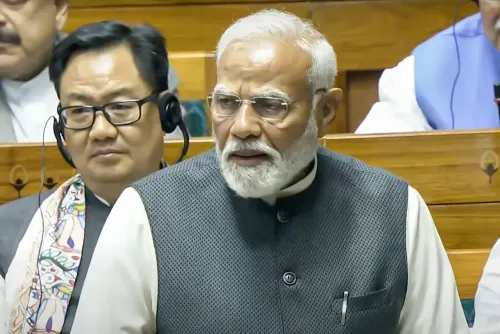Understanding the Necessity of the Income-Tax Bill 2025

Synopsis
Key Takeaways
- The Income-Tax Bill 2025 aims to simplify India's tax structure.
- It proposes reducing the number of sections and eliminating redundant exemptions.
- The bill emphasizes technology-driven tax compliance.
- It seeks to enhance fairness in the tax system for all businesses.
- The initiative aims to boost foreign investment in India.
New Delhi, Feb 12 (NationPress) As India approaches a significant tax reform, the new Income-Tax Bill 2025 aims to streamline the tax framework, enhancing its transparency, efficiency, and business-friendly nature.
Set to be presented in Parliament on Thursday, this proposed legislation intends to replace the long-standing Income Tax Act of 1961, which has become increasingly convoluted due to ongoing amendments, judicial interpretations, and various exemptions.
Although these alterations were made with good intentions, they resulted in a tax code that has become challenging to comprehend, leading to increased litigation, higher compliance costs, and confusion for taxpayers.
The Income-Tax Bill 2025 proposes reducing the number of sections from 819 to 536, removing unnecessary exemptions, and cutting down the overall word count from 5 lakh to 2.5 lakh.
A pivotal change in India’s tax policy was initiated in 2017-18, marked by a reduction in corporate tax rates alongside the removal of several deductions.
This shift aimed to create a fairer system, particularly benefiting small enterprises previously hindered by intricate tax regulations.
By discarding superfluous tax incentives and advancing toward a more equitable tax system, the Government seeks to guarantee that all taxpayers fulfill their obligations without exploiting loopholes.
This initiative will fortify India’s tax base and enhance revenue stability over time. Additionally, the bill aligns India’s tax framework with global best practices.
By adopting successful international tax models, the Government aspires to elevate investor confidence and draw more foreign enterprises.
A well-organized, transparent tax system positions India as a more appealing venue for economic development.
A significant aspect of the new bill is its emphasis on technology-driven tax compliance.
As digital solutions advance, tax scrutiny and filing are transitioning towards automation and AI-based assessments, enhancing tax administration and curbing tax evasion.
To promote greater clarity, the bill incorporates tables, illustrations, and formulas to elucidate tax provisions, simplifying the interpretation process for individuals and businesses alike.
By clarifying tax regulations, the Income-tax Bill 2025 will enable businesses to concentrate more on growth and investment rather than tax strategizing.
The blend of lower rates and unambiguous regulations fosters a more business-friendly atmosphere, propelling economic growth.










